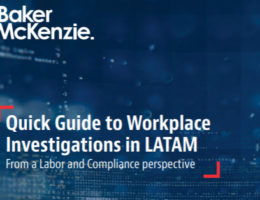Mainly during the pandemic, the use of technological resources for performing a job has significantly grown. As a result, the access to such resources in the context of internal investigations has become almost a must. This triggers relevant concerns from a data privacy and a labor perspective.
In
Cybersecurity, Data and Tech
Latin America: Quick guide to workplace investigations in LATAM
by Jonathan Adams, María (Vanina) Vanina Caniza, Jesus Davila, Sebastian Doren, Carlos A. Felce, Tatiana Garcés Carvajal, Alberto José González Torres, Ma. Rosario Lombera González, María Carolina Pardo Cuéllar, Monica Pizarro, Teresa Tovar, Andrés Valdés, Leticia Ribeiro C Figueiredo and Heloísa Barroso Uelze
2 Mins Read






